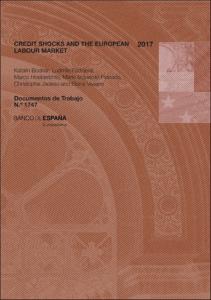Credit shocks and the European Labour market
Autor
Bodnár, Katalin; Fadejeva, Ludmila; Hoeberichts, Marco; Izquierdo, Mario; Jadeau, Christophe; Viviano, Eliana
Fecha de publicación
1-feb-2018
Descripción física
32 p. : gráficos, tablas
Resumen
Más de cinco años después del inicio de la crisis de la deuda soberana en Europa, su impacto sobre las variables del mercado laboral no está claro. El objetivo de este documento es contribuir a llenar este vacío. Utilizamos datos cualitativos a escala de empresa para 24 países europeos, recopilados en la Wage Dynamics Network (WDN) del SEBC. Primero, construimos un conjunto de índices que miden las dificultades para acceder al mercado crediticio en los 24 países para el período 2010-2013. En segundo lugar, describimos la relación entre las dificultades crediticias y los ajustes en las variables laborales tanto en el margen extensivo como intensivo del empleo, así como en los salarios. Encontramos una correlación fuerte y significativa entre las dificultades crediticias y los ajustes a lo largo del margen extensivo y del margen intensivo. En cuanto a los salarios, en presencia de dificultades del mercado de crédito, las empresas reducen el componente variable de los salarios
More than five years after the start of the Sovereign debt crisis in Europe, its impact on labour market outcomes is not clear. This paper aims to fill this gap. We use qualitative firm-level data for 24 European countries, collected within the Wage Dynamics Network (WDN) of the ESCB. We first derive a set of indices measuring difficulties in accessing the credit market for the period 2010-13. Second, we provide a description of the relationship between credit difficulties and changes in labour input both along the extensive and the intensive margins as well as on wages. We find strong and significant correlation between credit difficulties and adjustments along both the extensive and the intensive margin. In the presence of credit market diffi culties, firms cut wages by reducing the variable part of wages. This evidence suggests that credit shocks can affect not only the real economy, but also nominal variables
More than five years after the start of the Sovereign debt crisis in Europe, its impact on labour market outcomes is not clear. This paper aims to fill this gap. We use qualitative firm-level data for 24 European countries, collected within the Wage Dynamics Network (WDN) of the ESCB. We first derive a set of indices measuring difficulties in accessing the credit market for the period 2010-13. Second, we provide a description of the relationship between credit difficulties and changes in labour input both along the extensive and the intensive margins as well as on wages. We find strong and significant correlation between credit difficulties and adjustments along both the extensive and the intensive margin. In the presence of credit market diffi culties, firms cut wages by reducing the variable part of wages. This evidence suggests that credit shocks can affect not only the real economy, but also nominal variables
Publicado en
Documentos de Trabajo / Banco de España, 1747
Materias
Dificultades crediticias; Ajuste del mercado laboral; Margen intensivo y extensivo; Credit difficulties; Labour input adjustment; Intensive margin; Fluctuaciones y ciclos económicos; Estructura y funcionamiento de la empresa; Mercados financieros; Mercado de trabajo; Europa
Aparece en las colecciones:












